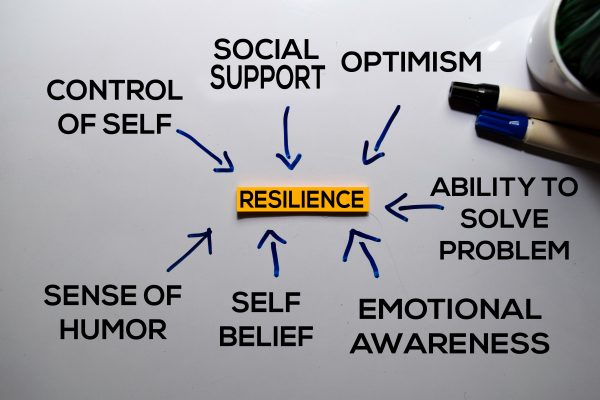Building resilient teams is a key goal for many leaders in one of the most challenging decades many of us have experienced.
Over the coming few posts, I will dive deeper into the key area of resilience and why comprehending what it is, and the consequences it brings for leaders is critical this year.
Understanding resilience has become more important for all of us due to the ongoing implications of the last few years.
Let’s think about what has happened.
Disrupted working practices, including remote and hybrid work and the challenge for many of now being asked to return to the office full time,
Couple this with declining mental health, a Gen Z workforce where 91% of workers report being stressed.
Then as an overlay, we have a global skill shortage which, according to Korn Ferry, the global consulting firm, could result in a shortfall of $8.5 trillion in revenue and growth, and of course, we have economic uncertainty continuing to hang over us.
All these circumstances impact our overall well-being; it’s no wonder our employees are struggling.
This is why building resilience in your team has become a critical factor for workplace success.
Resilient employees can better cope with stress and adapt to changes, leading to improved productivity, job satisfaction, and mental health.
Moreover, resilient employees are less likely to experience burnout, a growing concern for employers worldwide.
Therefore, leaders need to understand the importance of resilience in the workplace and implement strategies to support their employees.
So first, let’s start with a definition.
What is Resilience?

A simple definition.
‘Resilience is adapting and coping with adversity, stress, and challenging situations. It is a process that involves a range of factors, including cognitive, emotional, and behavioural skills.
Resilient individuals can recover quickly from setbacks, learn from their experiences, and use that learning to grow and thrive. They can maintain a positive outlook, remain flexible, and stay focused.’
Let’s clarify.
Resilience is not a fixed trait that some people possess, and others do not.
It is a set of skills and strategies that can be developed and strengthened over time. Research has revealed various factors, including genetics, environment, and life experiences, influence resilience. While some individuals may be naturally more resilient than others, everyone has the potential to build resilience and improve their ability to cope with whatever is appearing in their lives.
Overall, resilience is a critical trait that can help individuals navigate the ups and downs of life and thrive in the face of adversity.
How To Spot An Employee Who Is Lacking Resilience?

Spotting an employee’s lack of resilience isn’t always easy, as individuals often cope and manage stress differently.
However, there are several classic signs of employees who are struggling.
They are late or absent: An employee who is not resilient may be more likely to miss work or arrive late as they struggle to cope with the demands of their job.
Decreased productivity or quality of work: In addition to not being ‘present’, they often struggle to maintain focus or may feel overwhelmed, leading to reduced productivity and generally delivering a much lower quality of work.
Negative attitude or demeanour: An employee who is struggling with resilience may exhibit a negative attitude which includes behaviours such as complaining, being irritable, arguing, and often having a pessimistic outlook.
Difficulty adapting to change: Change becomes hard for them as they grapple with accepting or handling changes in the workplace, such as new processes or technologies or team members which compound their lack of productivity to the point where deadlines are consistently missed.
Increased stress or anxiety: Everything they are experiencing through the process results in increased stress or anxiety, which can lead to physical symptoms such as headaches, fatigue, or trouble sleeping.
What Is The Downside of Employees Not Being Resilient?
The implications for an employer centre around a lack of productivity and, for an employee, a lack of enthusiasm and self-esteem as they inhabit a role that no longer satisfies them.
Overall, the implications for a un resilient employee can be significant for their well-being and the organisation’s performance.
Logically, leaders need to prioritise employee well-being and support the development of resilience skills in all their employees.
Helping Employees Become More Resilient
I will cover this in more detail in future posts; here are several areas to consider for now.
Foster a Positive Work Culture and Encourage Self Care

Leaders need to create a positive work culture that prioritises employee well-being. This includes promoting work-life balance, supporting mental health, encouraging self-care, and recognising a job well done by employees; saying thank you is often underrated and makes a huge difference.
The good news is that multiple employee wellness programmes are available to support your organisation.
Finally, when it comes to culture, remember our employees want to feel heard and valued, and then they become engaged, productive, and enjoy their jobs.
Provide Training and Development Opportunities
Training and development help employees build their resilience skills. This can include stress management, time management, and communication skills training. By providing these opportunities, leaders can help employees develop the skills they need to cope. Here at Zestfor, we are developing a programme to support you in building resilient employees and teams. Drop me your name and email address here if you want to find out more.
Until next time,
Julia
About Zestfor
Zestfor delivers training coaching and development programs and resources scientifically tailored to develop leaders and their teams in technical markets – including Pharmaceutical, I.T., and Life Sciences.
Our blend of in-classroom, online, and virtual live-stream delivery methods will engage and assure even the most introverted team members from the first meeting. Let us arrange a brief chat; call us at 0845 548 0833.









